How to Choose Window Treatments for Your Home

From adding texture, dimension, and softness to a space, the right window covering can elevate a room from simple to spectacular.
So, how do you choose the right window treatments for your home? Keep reading to learn about the different types of window coverings, things to consider when making the choice, and current window treatment design trends.
What are the different types of window treatments?
There are many words to describe window treatments, and they’re often used interchangeably. If you’re new to choosing window coverings, you may think curtains and drapes are the same. There are nuances in every style, and knowing the differences can help you make better decisions for your space.
1. Curtains & Drapes
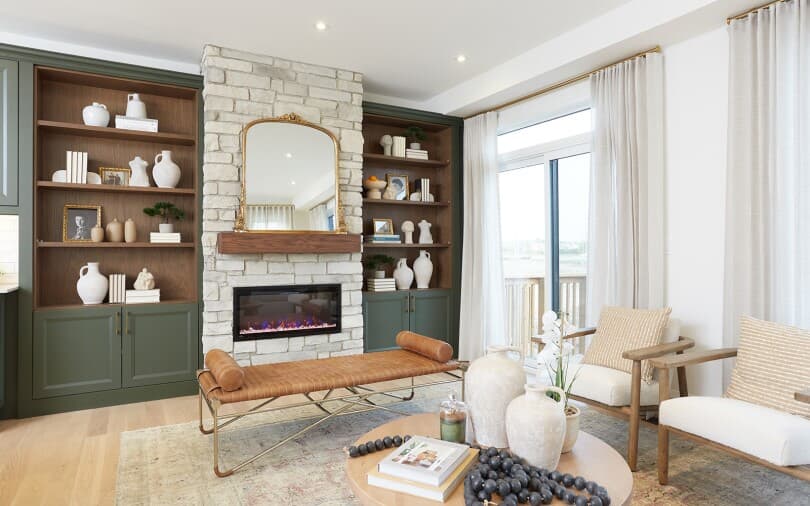
Denmar Floor Plan, Traditional Collection, New Seaton Community, Pickering, Ontario
At a basic level, curtains and drapes are typically two pieces of fabric that travel across the width of the window. The terms are often used interchangeably, but they differ in style and function.
Curtains are typically made from lighter fabrics and are often unlined, creating a relaxed and airy look. They’re best suited for spaces where light control and privacy are less critical.
Drapes, on the other hand, are usually made from heavier fabrics that are often lined, offering better light-blocking and insulation. This distinction makes drapes ideal for more formal settings where you want to create a sophisticated appearance and need more privacy and light control.
Either choice is a multifunctional option that will work in just about any space. With so many fabric and pattern options and the ability to pair them with almost any other window treatment, you can create a space perfectly tailored to your style.
2. Blinds
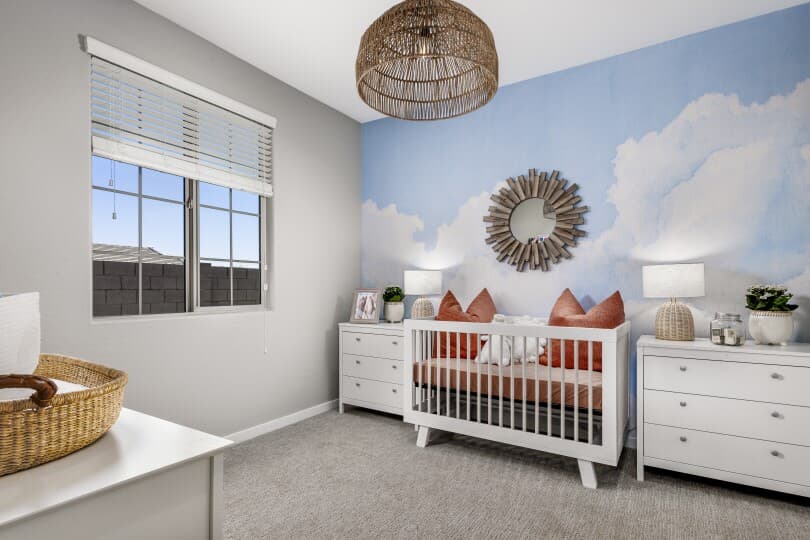
Laredo Floor Plan, Laurel Collection, Blossom Rock Community, Apache Junction, Arizona
Blinds are versatile window treatment options available in various materials, each offering its own benefits. Wood blinds provide a warm, natural look and excellent durability, while faux wood blinds mimic the appearance of natural wood while being more resistant to moisture and warping. This makes them suitable in more rooms, such as the kitchen or bathroom. Aluminum blinds are lightweight, budget-friendly, and come in various colors, perfect for a modern aesthetic.
You can choose from different slat sizes, typically ranging from ½ to 2½ inches, allowing customized light control and privacy. Control options include standard cord mechanisms, cordless systems for enhanced safety and a sleek look, and motorized options for convenience and smart home integration.
3. Shades
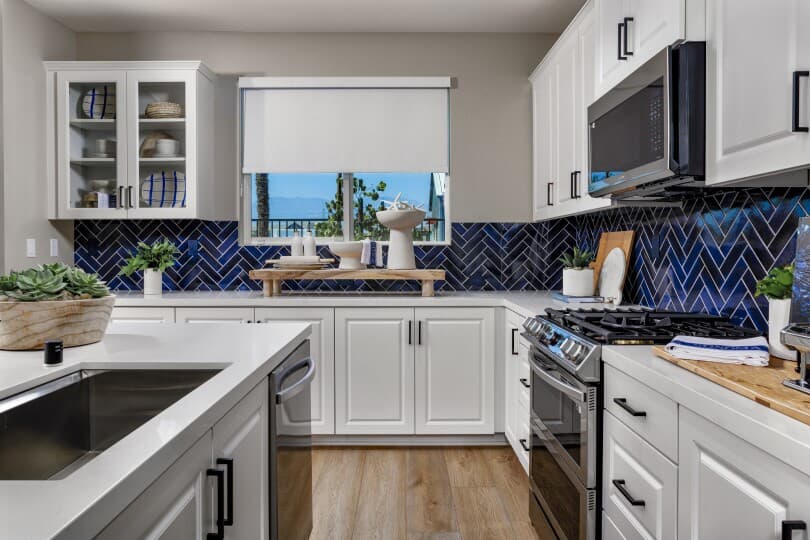
Residence 6 Floor Plan, Row Collection, New Haven Community, Ontario, California
Shades offer a sleek and functional option with various styles to suit different needs. If you have little ones or pets in the home, long curtains may not be ideal with the temptation for little hands to pull. Roman shades are a great alternative to drapes or curtains if you still want a fabric window treatment while staying tucked away within the framework of the window. When they’re closed, they block out most light while maintaining privacy.
As the name implies, roller shades effortlessly roll up and down for smooth light control. Their clean, minimalistic design suits any décor style, from modern to traditional. If you have interesting architectural details like thick molding around your windows, roller shades are a good choice as they sit within the frame, allowing you to cover the window without covering the detail.
Also known as “honeycomb shades,” cellular shades are typically the most energy-efficient window treatment available. They are composed of numerous fabric cells that expand and contract like an accordion when the shade is raised and lowered. Cellular shades are designed to trap air, provide great insulation, create comfortable indoor temperatures, and help lower energy bills.
There are options of sheer, light-filtering, and room-darkening materials coupled with hundreds of colors, textures, and fabrics, resulting in endless possibilities. It's easy to see why cellular shades are one of the most popular choices on the market.
4. Shutters
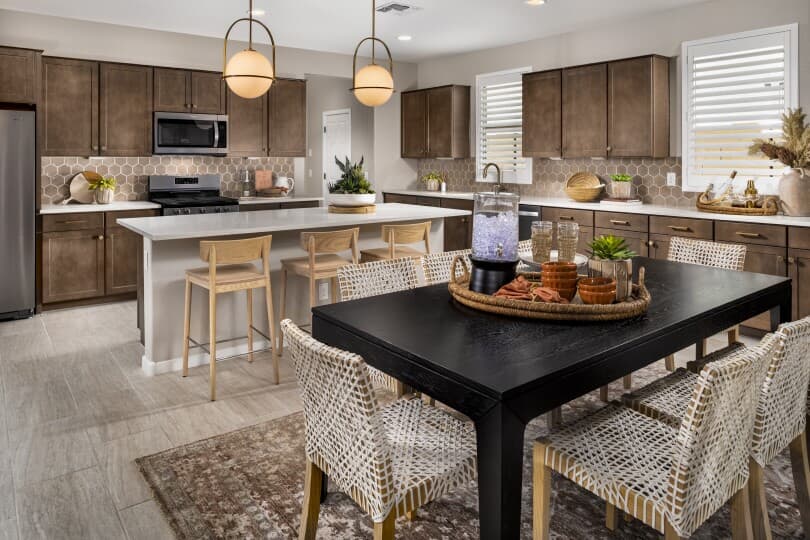
Azure Floor Plan, Highland Sage Collection, Alamar Community, Avondale, Arizona
Shutters are a classic and durable window treatment that offers a distinct “wow” factor to any space. Traditional shutters are known for their wide louvers and elegant look, providing excellent light control and privacy while adding a touch of sophistication to any room.
Shutters are installed directly on the window frame, resulting in fewer gaps. When they’re closed, there’s an air space barrier between the window and shutter, which decreases the amount of heat lost or transferred into the room.
Shutters come in various materials: wood shutters provide a timeless and warm appeal, composite shutters off the look of wood with increased durability and moisture resistance, and vinyl shutters are cost-effective, low-maintenance, and ideal for high-humidity areas like bathrooms and laundry rooms.
What factors do I need to consider when choosing my window treatments?
Window treatments fall into that beautiful overlap between personal style and functionality. They’re a design element that serves a purpose while reflecting your taste all at once. Your window coverings may need to function differently from room to room. Here are a few things to consider when choosing a window treatment for a space:

Lucca Floor Plan, Estate Collection, Livingston Community, Calgary, Alberta
1. Light Control & Room Functionality
How much light control you need will likely depend on how you use a space, so you’ll want to match your window treatments to the purpose of your rooms. Blackout curtains may be ideal for a bedroom, while sheer shades make the most sense for your living area.
Start by reviewing the directions your windows face. North-facing windows will receive the least direct sunlight, while the others will likely receive direct sunlight at some point during the day. All window treatments are designed to control the amount of sunlight that is let in, but they will differ in how they do so. Consider how much light you want to allow in versus the need to block out harsh rays and glare.
2. Privacy Needs
The surroundings of your home will determine your privacy needs. You’ll likely choose a different window covering if you have nearby neighbors than you would with open space around you. Consider how you use the room and if you’d be comfortable with someone being able to see inside. If the space overlooks your private backyard, you may be fine with a sheer fabric or something you can leave open most of the day. If the room faces the front of your home and you have neighbors nearby, you may be better off with something more private.
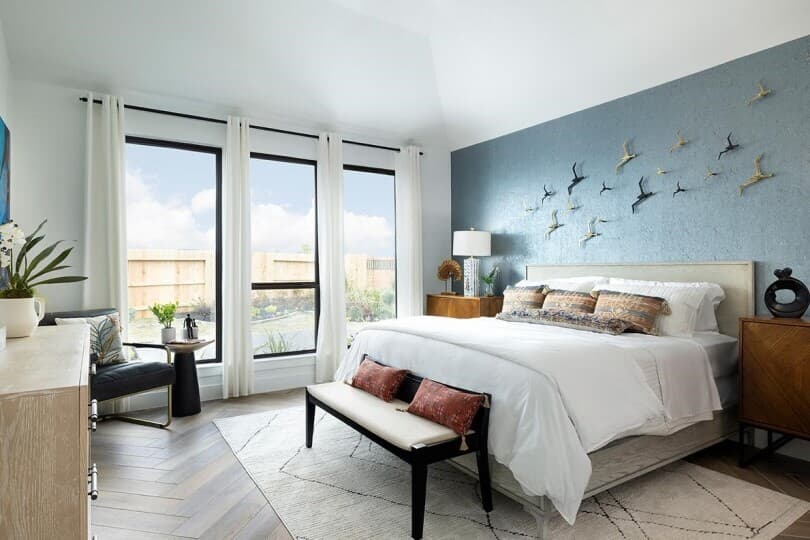
Rutger Floor Plan, Traditional Homes Collection, Elyson Community, Katy, Texas
3. Energy Efficiency & Insulation
While windows give you beautiful views outside, they’re also the primary sources of letting heat in and out of your home. Window coverings are one of the best ways to keep your home energy efficient.
A room that gets lots of afternoon summer sun would benefit from a window treatment with greater insulation to stop the space from heating up, much like the same window covering would cozy up the room in the winter by keeping the warmth inside. While you may not mind if your home office cools down at night, you might not feel the same about your bedroom.
4. Exterior Views
In a perfect world, we would have pleasing views from every window in our home. While we may have picturesque mountains out the front, you might have your neighbor’s shed peeking over the fence in the back. Window treatments are a great way to frame the view or block some of those unsightly scenes.
5. Aesthetics
Window treatments are the last piece of the puzzle within a room. They’re a great way to reflect the style and mood of your space while complementing your décor through color, texture, and patterns. If the space lends itself to an organic, earthy feel, you don’t want a heavy fabric that feels too stuffy.
Your window coverings are meant to embellish and beautify the space, not take away from the ambiance you’re trying to create. It’s about finding that perfect blend between function and looks, and with a variety of window treatments available, it’s easier than you think!
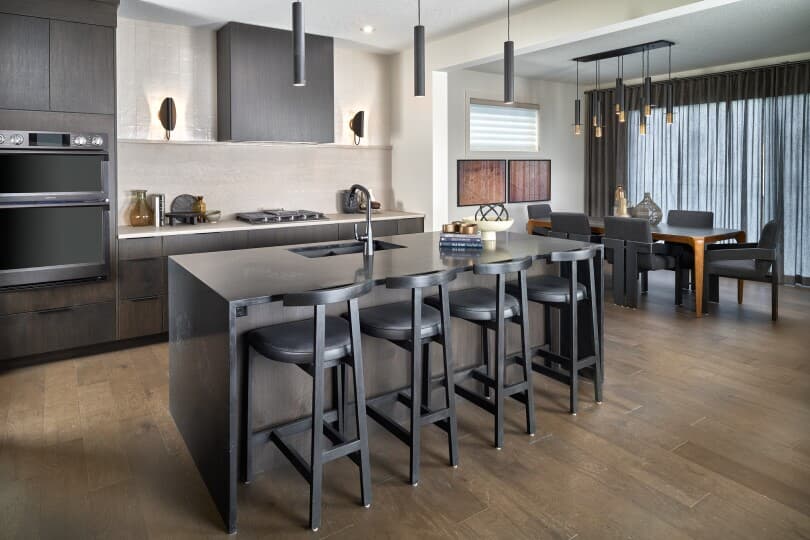
Columbia 26 Floor Plan, Front Garage Conventional Collection, Livingston Community, Calgary, Alberta
What window treatments are trending in 2024?
2024 home design trends focus on personalization like never before. Homeowners are shifting away from replicating what they see online towards one-of-a-kind styles that truly reflect their taste.
Window treatments this year are no exception, meaning you’ll make choices you’ll love for years to come, regardless of changing trends.
1. Textured Solids
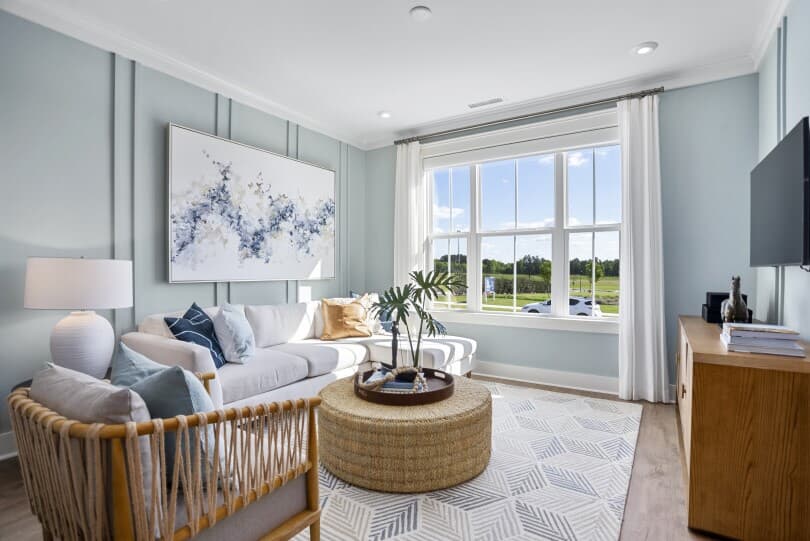
Lennox Floor Plan, Townhomes Collection, Wendell Falls, Wendell, North Carolina
Textured solids create a tactile experience, elevating your windows into an engaging design feature by adding depth and interest to a room without relying on the complexity of patterns. If you prefer a sophisticated, minimalist look, using a textured solid may be the perfect solution. Materials such as linen, silk, and woven fabrics introduce subtle variations and rich textures that can elevate the overall aesthetic of any space.
2. Earthy Tones
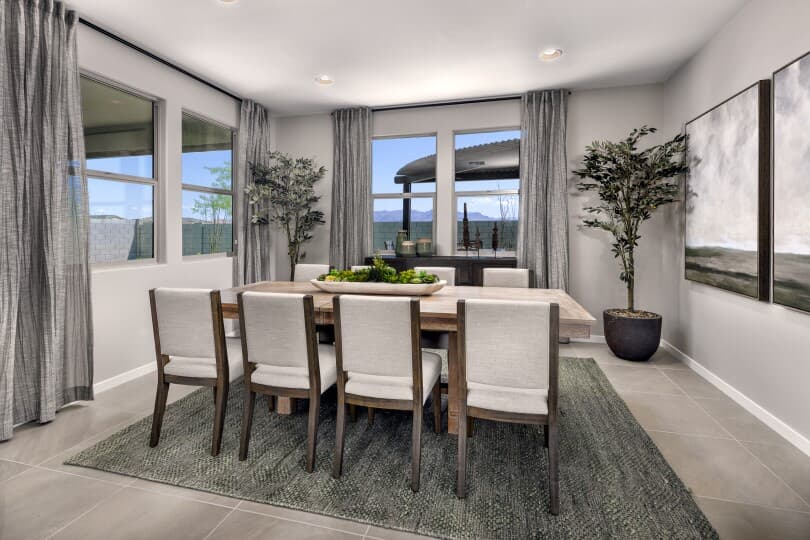
Lily Floor Plan, Mariposa Collection, Blossom Rock Community, Apache Junction, Arizona
Earthy tones are a popular choice for window treatments and interior design as a whole. Colors inspired by the outdoors, such as moss green, sky blue, forest brown, and stony gray, bring a natural and calming vibe to any space. Being out in nature is a calming, stress-relieving experience, so using earthy tones for your window treatments helps to create that sense of serenity indoors. These hues evoke a connection to the natural world, making your home feel like a peaceful retreat.
3. Warm, Light Neutrals

Residence 2 Floor Plan, Patina Neighborhood, RiverSound Community, Napa, California
Warm, light neutrals like ivory, beige, and tan are timeless and classic color choices you can enjoy in your home for years to come. These tones are bright, inviting, and versatile, pairing well with any style you choose in the rest of the space. Warm, light neutrals lend themselves to creating a cozy and welcoming atmosphere that enhances the overall aesthetic of your home.
4. Woven Textures
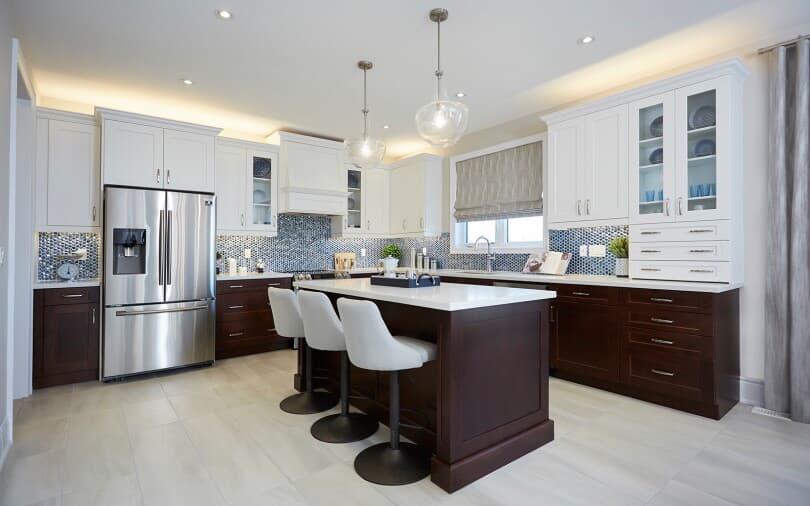
Westwood Floor Plan, 60' Detached Collection, Heartland Community, Baxter, Ontario
Woven shades have become increasingly popular over the last decade, and there’s no sign of them fading soon. Materials such as bamboo, grasses, and reeds add a natural, organic element to your room, offering texture and subtle interest. The wood tones provide a sense of warmth and complement the larger interior design trend of biophilic design, which emphasizes a connection to nature.
5. Sheer Drapery
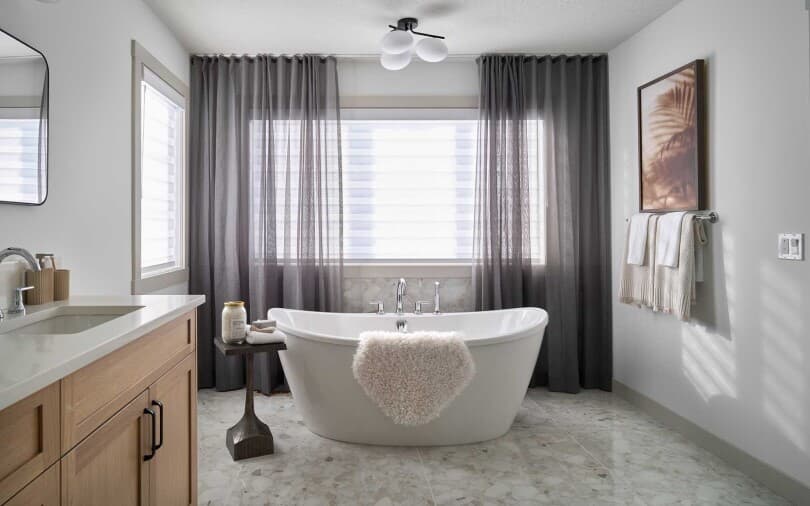
Columbia 2 - 24 Floor Plan, Front Garage Collection, Silver Spruce Community, Calgary, Alberta
Nothing is quite as soft and inviting as sheer drapery. Available in varying levels of opacity, from sheer to semi-sheer, homeowners have a wide range of light and privacy control choices. These curtains are perfect for spaces where you don’t require a lot of privacy but want to maximize natural light, creating a bright and airy atmosphere that enhances the room’s overall ambiance.
6. Bold Patterns
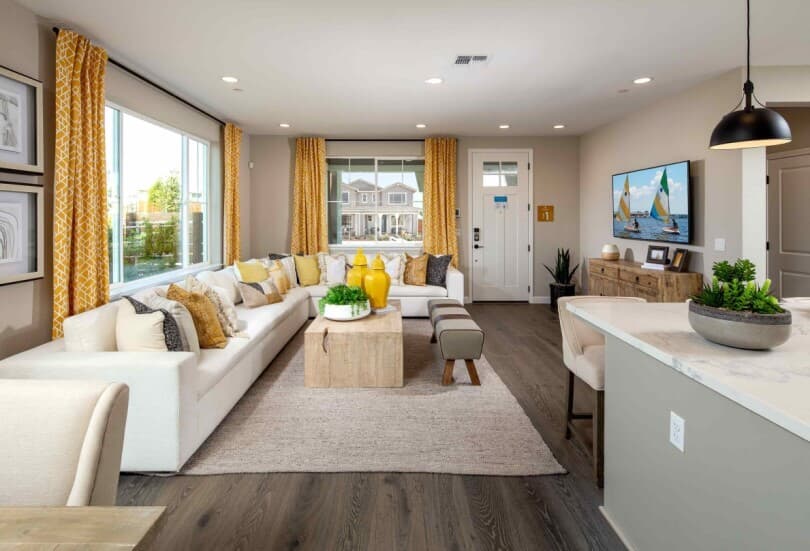
Residence 1 Floor Plan, Horizon Neighborhood, One Lake Community, Fairfield, California
With 2024 being the year for personalization, geometric and floral patterns are being used to create dynamic focal points in home décor. To make a statement, try experimenting with natural colors like chocolate tones, navy blue, or hunter green, or opt for prints that feature bold patterns and tropical colors. While an extra pop adds interest, it’s important to balance the pattern and color to ensure the space doesn’t become visually chaotic.
7. Layered Treatments
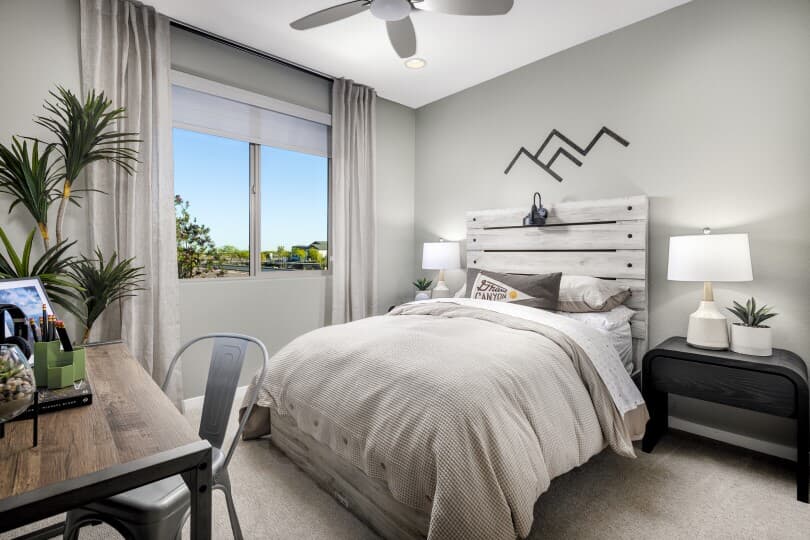
Lily Floor Plan, Mariposa Collection, Blossom Rock Community, Apache Junction, Arizona
Layering two or more window treatments allows for versatility and dimension. You increase functionality with more control over privacy and light while improving aesthetics with varied colors and textures. Combining a light sheer curtain with heavier drapes, for instance, adds both style and function: you can enjoy natural light during the day and achieve privacy and coziness in the evening. This technique gives your windows a sophisticated look and maximizes their functionality.
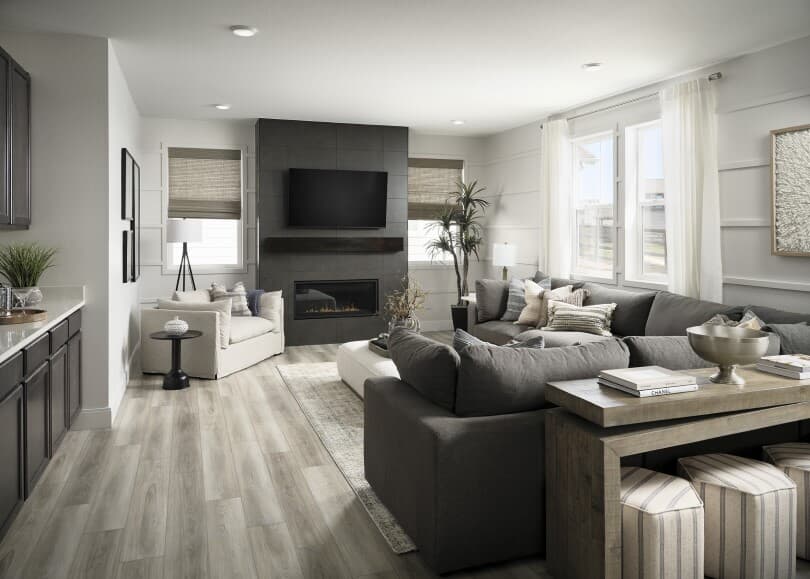
Artisan Four Floor Plan, Artisan Portfolio, Barefoot Lakes, Firestone, Colorado
Choosing the right window treatments for your home involves consideration of both aesthetics and functionality. From the elegance of drapes to the versatility of blinds, and the modern appeal of shades to the classic charm of shutters, there is a wide array of options to suit any style and need. By thoughtfully selecting your window treatments, you can create a home environment that is stylish, comfortable, and uniquely yours.
If you’re looking for more design advice, homebuying insights, or moving tips and tricks, the Brookfield Residential blog covers it all. Be sure to follow along for more!
